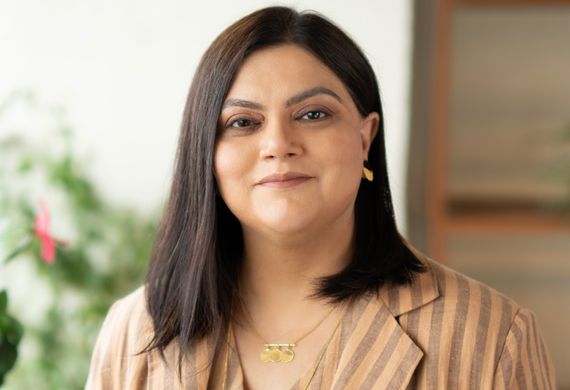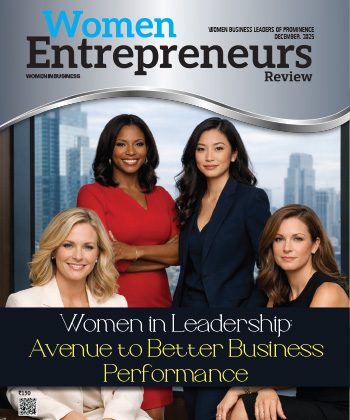
Breaking Barriers: Empowering Women Leaders through Authentic Leadership & Innovation
By: Tanya Chaitanya, CEO, Her Circle & President, Digital-Diversity, Reliance
Tanya Chaitanya, CEO and Editor-in-Chief for Her Circle & Digital & Diversity Initiatives at Reliance has led transformative growth in women’s digital media. Previously, as Editor-in-Chief at Femina India, she expanded its digital presence 7X. At Reliance, she spearheads Her Circle, a comprehensive digital community for women.
In a conversation with Women Entrepreneurs Review Magazine, Tanya discusses the persistent barriers faced by aspiring women CEOs in traditionally male-dominated fields, explores strategies for overcoming gender biases, and envisions leveraging creativity & innovation to enhance diversity and inclusivity in executive leadership teams.
In your opinion, what are the key barriers that still exist for women aspiring to reach CEO positions in traditionally male-dominated industries? How can these barriers be effectively dismantled?
The mindset is truly the key barrier. It is not as though women can’t achieve and hold a position of value and worth, the issue is that largely the corporate world believes they can’t. This in turn can make even the most confident professional doubt her self-worth and sink into the infamous imposter syndrome where she feels undeserving of her position and power. This vicious circle repeats itself.
Changing mindsets and mentality is a challenge because this is decades of conditioning that now pulls us back.
However, as women role models are spotlighted, other women get to see more of their ilk holding seats of power, and their confidence and will are empowered.
Education is a key factor and what the young generation is imbibing will reflect in the future too. Shattering stereotypes at an early age will reap benefits in the future.
In my opinion, another important factor is to have not just key positions at the top for women but to have a diverse evolving pipeline of managers and entry-level individuals of both genders at parity.
As a trailblazing woman CEO, what strategies have you employed to navigate and overcome gender biases and stereotypes in the business world? How can other leaders adopt similar approaches within their organizations?
I have stayed true to my personality type. Not being naturally gregarious, I am a firm, clear, non-abrasive but extremely tough individual. I do not conform to any form of patriarchy. One of the things I learned early on in my career was that there is no one way to achieve something. Hence, I allow ideas to flow in and am open to suggestions. Gender stereotyping is part and parcel of our lives, but I don’t allow for any disrespect to me or any woman in my team. Sexist jokes or language are both very clearly rejected. I am also very clear that my leadership style is not to socialize in the after-hours with colleagues and as a professional, I set clear boundaries. What I do extensively on the other hand is to delegate right, identify the best people in my team, and give wings to their ideas.
It has been 2 decades of leading different set-ups and these few strategies have stood me in good stead.
To other women in similar positions, I would advise not to change your personality type or start behaving like a male leader to gain a foothold. Any pretense does not last long and is a deterrent to real growth both for the individual and the company.
As per your extensive experience as a creative leader, how do you envision leveraging creativity and innovation to foster gender diversity and inclusivity within executive leadership teams across various industries?
Unlike data, creativity and innovation are not bound. Numbers never tell a full story and while necessary, they are not my favorite storytelling tools. Ideas that defy imagination and innovative solutions to tough challenges must be encouraged. Women are in a unique position of being problem-solving muti-taskers who can hold an infant in one arm and balance a laptop in another while pushing the dishwasher door shut with their left shoe.
The more diversity-based policies, talks, interactions; and workshops can happen in a system the more conversations open up faster. Executive leadership positions are replete with seniors who have not seen diversity and oftentimes; they do not deem it necessary for growth. Hence the workshops and conversations at senior levels gain more of a precedence and value.
Reflecting on your entrepreneurial journey, what strategies have you found most effective in fostering a culture of empowerment and inclusivity, particularly for women, within startups and emerging enterprises?
Mentoring women holds the key to their growth in any system. The more we give in terms of learning, the faster they grasp and with their unique requirements, they benefit from those more experienced. When it comes to start-ups and emerging enterprises, the pace of delivery is paramount but also multiple-tasking is essential women inherently are blessed as multi-taskers and hence, pull off many tasks. Delegating and entrusting women to handle end-to-end projects is a major way forward.
From your perspective, how can organizations implement data-driven approaches to identify and address gender disparities in leadership roles, and what metrics or key performance indicators (KPIs) should business leaders prioritize to measure progress in this area?
Equity not equality becomes the operative word here.
KPIs that work well for women across organizations are high-quality delivery within flexible timelines. Women shoulder far more extensive responsibilities, in domestic and work life, so in order to give them equity we need to keep in mind their most productive projects may not align with how the male population performs. How they do an assignment should not be the focus, what they bring to the table should most certainly be the focus.
As a leader who has successfully navigated the intersection of business and social impact, what advice would you offer to aspiring women entrepreneurs and executives who are striving to make a meaningful difference in their industries while advancing gender equality on a global scale?
Business is important and ROI is paramount. But the larger impact is sometimes in being able to mentor, impart your learnings to others and always having an open-minded approach to new ideas. Your own success is an inspiration to others but when you mentor and build more gender-equal leaders, that changes the game and builds a circle of excellence.
Most Viewed
- 1 Women's Health Startup HerMD Closing Doors Amid Industry Challenges
- 2 5 Famous Women in Indian Armed Forces
- 3 Saudi Women No longer Require Male Permission for Clothing Choices, says Prince MbS
- 4 Kolkata Medtech Startup Innovodigm Raises Rs 5.5 Crore Seed Funding Led by IAN Group
- 5 Yamunanagar's Kashish Kalra Honoured after Securing 111th Rank in UPSC Civil Services Exam
- 6 Madurai Appoints Its First Woman Corporation Head
- 7 IAS Vijayalakshmi Bidari Appointed as the new Nagpur Divisional Commissioner
- 8 American Entrepreneur Lucy Guo Overtakes T Swift to become Youngest Female Billionaire
- 9 ICC Women's World Cup 2025 Trophy Showcased at Indore's Holkar Stadium
- 10 Aparna Saxena's Beauty Venture AntiNorm Launches in India
- 11 Vidya Nataraj Co-Founded BlueStone Jewellery & Lifestyle files IPO
- 12 5 Women Freedom Fighters of India
- 13 Dr. G Krishnapriya appointed as CEO for Trichy
- 14 M3M & Sirona Partner to Introduce Menstrual Hygiene Vending Machines in 15 Locations
- 15 Punjab Govt launches SHE Cohort 3.0 Supporting Tech-led Women Startups
- 16 Indian origin Lawyer, Sweena Pannu appointed as the US New Superior Court Judge
- 17 The Aurora Tech Award recognizes 4 Indian Women-led Startups
- 18 Kerala's Republic Day parade featured an all-female tableau
- 19 Manisha Kabbur Becomes Karnataka's First Woman International Karate Coach
- 20 Director K. S. Ravikumar's Daughter Maalica Ravikumar Launches Life Coaching Company 'Evergrowth Academy' for Women
- 21 Leezu's Raises Pre-Seed Funding to Accelerate Growth in Sexual Wellness Industry
- 22 Sattu: Super-easy summer drink for PCOS gut healing
- 23 Swathi Nelabhatla creates Sitha App, India's First Women-Exclusive Gig Platform
- 24 7 Timeless Female Kathak Dancers & their Iconic Legacies
- 25 Meet 7 Iconic Women Architects of Modern India & their Most Impactful Work
- 26 This Woman-led Insuretech Startup is Helping Bridge the Education Financing Gap in India
- 27 Women Leaders Share Lessons Learnt from India Women's WC Win
- 28 5 Enterprising Women Founders Powering Singapore's Tech & Innovation Landscape
- 29 4 Women. 4 Stories. One Vision for Smarter, Stronger Healthcare
- 30 Global Gender Gap Narrows to 68.8%, But Full Equality 123 Years Away: WEF Report 2025
- 31 Changemakers: 7 Women Entrepreneurs Taking the Make in India Movement Forward
- 32 Meet Lucy Guo, The Youngest Self-Made Female Billionaire Disrupting Tech
- 33 How Women are Driving India's Festive Online Shopping Surge






